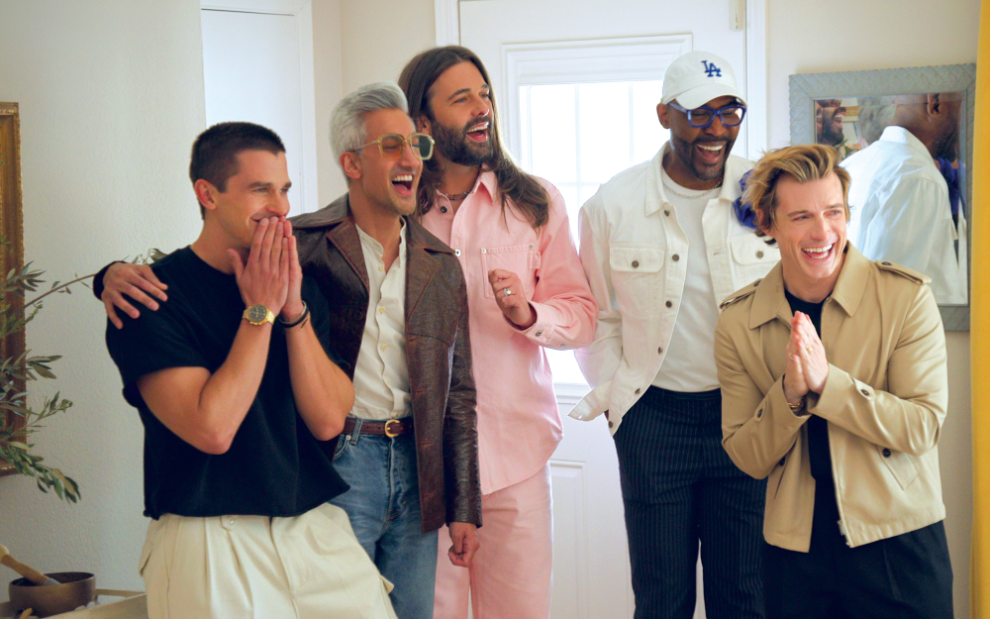For those who dedicate their lives to serving others, reality television often feels far removed from their daily experiences. If your work involves providing job opportunities for those who formerly were incarcerated or advocating for victims of human rights abuses, competing for a cash prize or a rose on national television might seem irrelevant—or even absurd.
To those immersed in society’s deepest struggles, much of reality TV is, at best, background noise and, at worst, a symptom of the very problems they are fighting. Yet, for all their dedication and selflessness, they may not realize just how much they need the Fab Five. No, I’m not talking about Duran Duran or the legendary Michigan basketball team. I’m referring to the hosts of Netflix’s uplifting must-watch series, Queer Eye.
Now in its ninth season, Queer Eye is a reality show like no other. Each episode features a selfless, big-hearted individual—nominated by someone who admires them—who has dedicated their life to helping others but has neglected their own needs in the process. The Fab Five step in to learn each person’s story, offer support, and help them rediscover a healthy work-life balance. The most powerful episodes highlight those who have spent their lives serving others, reminding them that they, too, deserve care and kindness. It’s rare to meet a Queer Eye fan who hasn’t admitted to shedding a few tears while watching these extraordinary people receive the same love they so freely give.
Whether it’s a Lutheran minister so devoted to his congregation that his parsonage is falling apart, a school principal who pours everything into her students while setting aside her own dreams, or a woman who founded a nonprofit to care for disabled and discarded animals but neglects her own well-being, Queer Eye reminds them—and all of us—that those who serve others are just as deserving of care themselves. How many people in church ministry or social justice work could use that same reminder?
Enter Antoni Porowski, Tan France, Jonathan Van Ness, Jeremiah Brent (or, in previous seasons, Bobby Berk), and Karamo Brown. Over the course of a week, they help these unsung heroes establish healthier habits, from improving their diets to addressing long-ignored self-care. With warmth and compassion, they encourage personal growth while providing much-needed guidance—and, often, a little therapy along the way.
“Do you realize that you are important, too?”
Before dismissing self-care as frivolous, consider the recent episode “Mother’s Day Slay.” Jen’Ya, a 33-year-old single mother, was unexpectedly abandoned by her husband and left to raise her daughter alone. Nominated by her 9-year-old daughter, Kemora, who simply wants her mom to “feel good again,” Jen’Ya has spent years counseling women who have experienced abuse or homelessness. Now, she finds herself in a similar struggle—searching for employment while barely making ends meet in a sparse apartment. For all its pretense of glitz and glamour, Queer Eye is focused on lifting up good people in need.
In fact, the most powerful episodes go beyond mere transformation—they challenge the assumptions of the hosts and reveal the complex societal issues we all navigate, if we take the time to see. This is powerfully showcased when interior designer Jeremiah Brent asks Jen’Ya if she has ever imagined what she would do with her apartment if she could. After a poignant pause, Jen’Ya answers, “Honestly, no.” This startling clash of two completely different lived realities breaks any sense of “entertainment.” Jeremiah, known for creating elegant spaces that elevate everyday living, is deeply moved by her story. This isn’t just another makeover or rescue—it’s a genuine encounter, one where mutual vulnerability opens the door to unexpected possibilities. Jen’Ya is given a new space that not only meets her needs but honors the incredible role model she is. In turn, Jeremiah finds a renewed appreciation for his own mother, who raised him alone.
Similarly impressive is the role faith often plays in these transformative moments. In an episode titled “The Flying Nun,” the Fab Five meet a remarkable woman who, in addition to advocating for human rights as a lawyer, volunteers as a spiritual director for people on death row in Louisiana. A former nun, deeply devoted to her faith and the culture of religious life, she seeks the Fab Five’s help in her quest to find a romantic relationship where she can truly connect with someone on a deeper level and share her life in a new way.
Touchingly, while receiving a makeover for the first time in more than 20 years, she breaks down, realizing how long it has been since she has allowed herself to be the recipient of kindness.
In another profound moment of healing, Bobby Berk, the interior designer on the show until the most recent season, despite his reservations about helping a Lutheran minister, since he had suffered growing up in an oppressive Christian context, renovates a church for its upcoming anniversary. The pastor, himself gay, takes the opportunity to acknowledge Bobby’s selflessness and offers a heartfelt apology on behalf of the church for the harm it had done to him. Tears again witness to their profound transformations.
Amid all of its dazzle and humor, Queer Eye witnesses to the dignity of every person. People involved in serving others all too often suffer in silence, which is not God’s will. Or, as Karamo says to a woman whose husband has been deported, leaving her to work long shifts, attend school, and raise three daughters on her own, “Do you realize that you are important, too?” She responds, “I am, but . . .” And with grace, he cuts in: “There’s no but.”
This article also appears in the April 2025 issue of U.S. Catholic (Vol. 90, No. 4, pages 36-37). Click here to subscribe to the magazine.
Image: Netflix
















Add comment